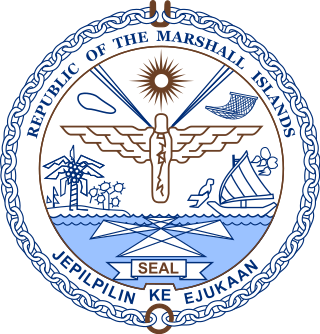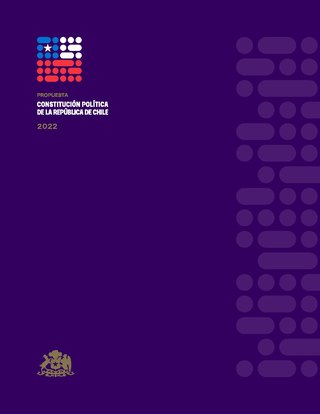
Impeachment is a process by which a legislative body or other legally constituted tribunal initiates charges against a public official for misconduct. It may be understood as a unique process involving both political and legal elements.

The Georgia General Assembly is the state legislature of the U.S. state of Georgia. It is bicameral, consisting of the Senate and the House of Representatives.

The president of Guyana is the head of state and the head of government of Guyana, as well as the commander-in-chief of the armed forces of the Republic, according to the Constitution of Guyana. The president is also the chancellor of the Orders of Guyana. Concurrent with their constitutional role as Commander-in-Chief of the Armed Forces, the president does not appoint a separate Minister of Defence. That portfolio is held by the president who fulfils all responsibilities designated to a minister of defence under the Defence Act.

Belonger status is a legal classification normally associated with British Overseas Territories. It refers to people who have close ties to a specific territory, normally by birth or ancestry. The requirements for belonger status, and the rights that it confers, vary from territory to territory.

Parliament of Sierra Leone is the legislative branch of the government of Sierra Leone. It is principally responsible for making laws. The Sierra Leone parliament consists of 149 members, of which 135 members are directly elected from across Sierra Leone's 16 districts, while 14 are paramount chiefs appointed from the 14 rural districts. The parliament is led by the Speaker of the House; the position is currently held by Abass Bundu of the Sierra Leone People's Party. The current elected 135 ordinary members of parliament are composed of members of the All People's Congress and the Sierra Leone People's Party which are the two largest political parties in Sierra Leone.

The Controlled Substances Penalties Amendments Act of 1984, 98 Stat. 2068, generally enhanced the penalties for violations of the Comprehensive Drug Abuse Prevention and Control Act of 1970. The 1984 legislation removed an ambiguity in the then-existing law by providing that a State drug felony conviction would trigger the provisions enhancing penalties for recidivists; it went further by providing that a Foreign drug felony conviction would have the same effect. Finally, the 1984 legislation doubled the penalties for distribution of controlled substances where the offense is committed on or within 1,000 feet of school property.
Impeachment in the Philippines is an expressed power of the Congress of the Philippines to formally charge a serving government official with an impeachable offense. After being impeached by the House of Representatives, the official is then tried in the Senate. If convicted, the official is either removed from office or censured.

The Sandiganbayan is a special appellate collegial court in the Philippines that has jurisdiction over criminal and civil cases involving graft and corrupt practices and other offenses committed by public officers and employees, including those in government-owned and controlled corporations. The special court was established by Presidential Decree No. 1486. It was subsequently modified by Presidential Decree No. 1606 and by Republic Acts 7975, 8249 and 10660. It is equal in rank to the Court of Appeals, and consists of fourteen Associate Justices and one Presiding Justice. The Office of the Ombudsman owns exclusive authority to bring cases to the Sandiganbayan.

The Protect America Act of 2007 (PAA),, is a controversial amendment to the Foreign Intelligence Surveillance Act (FISA) that was signed into law by U.S. President George W. Bush on August 5, 2007. It removed the warrant requirement for government surveillance of foreign intelligence targets "reasonably believed" to be outside the United States. The FISA Amendments Act of 2008 reauthorized many provisions of the Protect America Act in Title VII of FISA.

The government of the Marshall Islands operates under a mixed parliamentary-presidential system as set forth in its Constitution. Elections are held every four years in universal suffrage, with each of the 24 constituencies electing one or more representatives (senators) to the lower house of RMI's unicameral legislature, the Nitijela. The President, who is head of state as well as head of government, is elected by the 33 senators of the Nitijela. Four of the five Marshallese presidents who have been elected since the Constitution was adopted in 1979 have been traditional paramount chiefs.
Article One of the Georgia State Constitution describes the Georgia Bill of Rights, a set of forty paragraphs which enumerate the Rights of Persons, the Origin and Structure of Government and other General Provisions. The Georgia Bill of Rights was written by Thomas R.R. Cobb under the title Declaration of Fundamental Principals, as part of the Georgia Constitution of 1861 when the State of Georgia seceded from the United States of America and joined the Confederate States of America.
Part Two of the Constitution of Albania is the second of eighteen parts. Titled The Fundamental Human Rights and Freedoms, it is divided into 6 chapters that consist of 49 articles.

The Constitution of Zimbabwe is the supreme law of Zimbabwe. The independence constitution of 1980 was the result of the 1979 Lancaster House Agreement and is sometimes called the Lancaster Constitution. A proposed constitution, drafted by a constitutional convention, was defeated by a constitutional referendum during 2000.
Part Eight of the Constitution of Albania is the eighth of eighteen parts. Titled Constitutional Court, it consists of 11 articles. Together with Part Nine (The Courts), and Part Ten (The Office of the Prosecutor) underwent radical changes in 2016 during the so-called Justice Reform, which were the efforts of lawmakers to fight corruption, organized crime, nepotism in the justice system.
Part Nine of the Constitution of Albania is the ninth of eighteen parts. Titled The Courts, it consists of 22 articles including the Article 144 which was repealed in 2016. Together with Part Eight (Constitutional Court), and Part Ten (The Office of the Prosecutor) underwent radical changes in 2016 during the so-called Justice Reform, which were the efforts of lawmakers to fight corruption, organized crime, nepotism in the justice system.

A twenty-three-part referendum was held in Palau on 4 November 2008 alongside the country's general elections. Voters were asked questions on requirements of citizenship to hold office, government provision of primary school and health care, the definition of marriage and term limits for Parliament. Only the proposal permitting naturalization for certain adoptees failed to obtain the requisite majority of the vote and majority in 3/4th of the states.

The Human Rights Defender of Armenia is the official ombudsman, who, acting pursuant to the Constitution of Armenia, as well as, principles and norms of international law, protects the human rights and fundamental freedoms of individuals. The office of the Human Rights Defender was established in 2003 and has since became a member of the European Ombudsman Institute. The headquarters of the Human Rights Defender of Armenia are located in Yerevan. Since 24 January 2022, Kristinne Grigoryan was elected as the Human Rights Defender of Armenia by the National Assembly.

A constitutional referendum was held in the Bahamas on 7 June 2016. Voters were asked whether they approve of four separate constitutional amendments. All four proposals were rejected.

Constitutional Convention elections were held in the Marshall Islands on 21 February 2017.

The proposed Political Constitution of the Republic of Chile was a Constitutional draft written by the Constitutional Convention of Chile between 4 July 2021 and 4 July 2022. An early draft was made available on 14 May 2022. The final proposal was made available on 4 July 2022.












